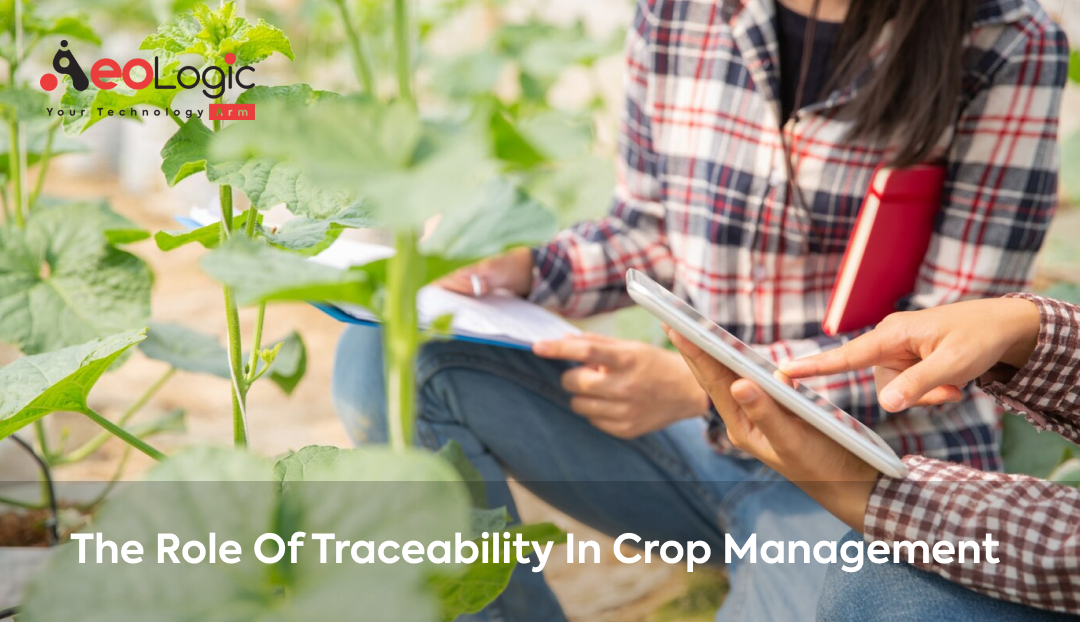In recent times, the accurate and timely traceability of products and conditioning throughout the supply chain has come as a crucial factor in food and agribusiness. More and more people around the world are demanding authenticity that food products are safe and of high quality. This frequently includes the role of traceability in crop management, or the capability to track where a product came from. Food safety and agriculture traceability are presently at the front of both assiduity and regulatory discussions around the world.
Also read: Implementing GS1 Standards to Improved Traceability
Role of Traceability in Crop Management – What Does It Really Mean?
Traceability is a tool for meeting consumer demands and assuring them that a farmer is indeed meeting their conditions. The role of traceability in crop management gives an information or could be a product tracking tool. Which is suitable to identify at any specified stage of the food supply chain (from product to distribution) from where the food came. And to where the food went. As applicable to the objects of the food examination and instrument system. Also, product traceability reduces business pitfalls and losses due to possible product recalls. Especially in the food assiduity.
Food manufacturers can help some food safety problems. By understanding all food product practices. Consumers are getting more concerned about food safety. And certain parts of the population are getting more concerned. For case, about how food is produced, and whether it’s organic, or minimum chemical use.
Avoiding Product Recalls Before They Occur
Product recalls in the food assiduity generally happens when a product fails on quality testing. This can be for different reasons. Including sanitation issues, unallowed agrarian practices by providers that fail to be reported on time, threat of foodborne illness, or some mistake that occurs during the final product process. In any event, once the examination services conduct a check and the item fails examination. It is safe to say that the damage has been made already. To avoid this from passing again, we need to trace the product back to the source. From the moment it was entered for processing to the moment it failed examination.
The Role of Traceability in Crop Management
Food supply chain traceability conditions play a significant part in helping businesses stay competitive in the domestic and global business. All while being conscious of public health. From distribution and transport to retail. All the way to the end consumer, the capability to trace a product through all stages of product plays an important part for any business dealing with yield. Food Traceability Systems, basically cover all aspects of product from farm to fork.
The role of traceability in crop management is as complex as keeping to global traceability norms. Which is why good traceability solutions are important in the food assiduity.
Also read: End-to-End Traceability Solutions in Aerospace and Defense
Benefits of Traceability For Farmers
The benefits of traceability are extensively recognized. Yet for small scale farmers in developing countries. Especially farmers producing horticultural and other fresh yield, transparency and traceability conditions can represent walls to trade. The market for traceable and safe food can count small scale agrarian producers. Who are lacking the resources for complying with highly strict norms. Especially conditions for tracking and covering environmental. And supply chain variables through sophisticated technologies.
Traceability is an imperative business practice for growers. Implementing product traceability isn’t a choice. It’s a question of how we do this in the best way possible, and how we take advantage of the openings that are arising. Let us take a close look at the top benefits for agri- food growers.
Optimized Supply Chains
An apparent advantage of digitizing supply chains is that it makes them traceable by creating a digital record of all conditioning and improves the capability to internally track and validate all conditioning from product and crop to warehousing and distribution.
The role of traceability in crop management, thus, makes the supply chain more transparent and offers better control over operations to all the stakeholders. It facilitates them to address pain points, for instance, as food loss or destruction, wastage, and identify openings to accelerate processes and make them cost effective.
Food Safety and Quality Compliance
One of the ways an effective food traceability system improves threat operation is by enabling agribusinesses to apply a medium for safety and quality compliance. The visibility that similar systems give allows stakeholders in the supply chain to quickly identify vulnerabilities and reduce their response time to food crisis, for example, as impurity or disease outbreaks.
More Price Realization
Agriculture traceability systems that capture farm position conditioning help farmers to authenticate that they have met the norms set by instrument bodies, particularly concerning the quality and safety of the product, fair labor practices, and the like. This helps them gain better access to original and global markets and negotiate advanced prices for the quality assurance they give. Several studies point to the fact that several consumers at this point are willing to pay added costs for products with traceability information.
Strengthened Brand Equity
Considering that today’s consumers are largely aware and concerned about the safety of the products they buy, traceability plays an integral part in their purchasing opinions and, accordingly, the trust they place in a brand or a product. Originally, prompt and visionary conduct on the part of the businesses during an exigency, as mentioned above, secures the consumers’ trust in the brand and their continued loyalty.
Secondly, farm to fork traceability systems also helps in preventing illegal and fraudulent practices right from the source and contribute to accurate instrument and product labeling. The certification will, in return, guarantee that the products are ethically sourced and fairly traded.
Also read: How Traceability is Reshaping Consumer Goods Distribution
Conclusion
Agri- food supply chains are complex networks that gauge topographies and impact a broad range of diligence and their operations. Enforcing end to end traceability in agriculture contributes to more than just regulatory compliance or assuring food safety. It lowers functional costs for farmers, improves profitability, regulates fraudulent conditioning or unethical practices, and unlocks new business openings. When stakeholders actively unite to apply a tech enabled end to end traceability system, supply chains can achieve their full capability.
Get in touch with us to know more about traceability solutions!










